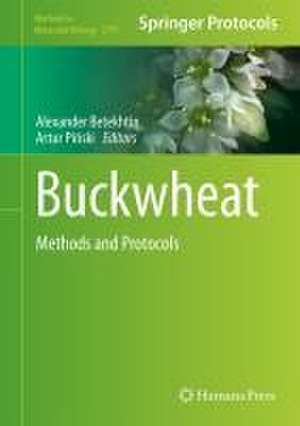Buckwheat: Methods and Protocols : Methods in Molecular Biology, cartea 2791
Editat de Alexander Betekhtin, Artur Pinskien Limba Engleză Hardback – 27 mar 2024
Practical and comprehensible, Buckwheat: Methods and Protocols is an ideal guide for plant scientists working in this field.
Din seria Methods in Molecular Biology
- 9%
 Preț: 791.63 lei
Preț: 791.63 lei - 23%
 Preț: 598.58 lei
Preț: 598.58 lei - 20%
 Preț: 882.98 lei
Preț: 882.98 lei -
 Preț: 252.05 lei
Preț: 252.05 lei - 5%
 Preț: 802.70 lei
Preț: 802.70 lei - 5%
 Preț: 729.61 lei
Preț: 729.61 lei - 5%
 Preț: 731.43 lei
Preț: 731.43 lei - 5%
 Preț: 741.30 lei
Preț: 741.30 lei - 5%
 Preț: 747.16 lei
Preț: 747.16 lei - 15%
 Preț: 663.45 lei
Preț: 663.45 lei - 18%
 Preț: 1025.34 lei
Preț: 1025.34 lei - 5%
 Preț: 734.57 lei
Preț: 734.57 lei - 18%
 Preț: 914.20 lei
Preț: 914.20 lei - 15%
 Preț: 664.61 lei
Preț: 664.61 lei - 15%
 Preț: 654.12 lei
Preț: 654.12 lei - 18%
 Preț: 1414.74 lei
Preț: 1414.74 lei - 5%
 Preț: 742.60 lei
Preț: 742.60 lei - 20%
 Preț: 821.65 lei
Preț: 821.65 lei - 18%
 Preț: 972.30 lei
Preț: 972.30 lei - 15%
 Preț: 660.49 lei
Preț: 660.49 lei - 5%
 Preț: 738.41 lei
Preț: 738.41 lei - 18%
 Preț: 984.92 lei
Preț: 984.92 lei - 5%
 Preț: 733.29 lei
Preț: 733.29 lei -
 Preț: 392.60 lei
Preț: 392.60 lei - 5%
 Preț: 746.26 lei
Preț: 746.26 lei - 18%
 Preț: 962.66 lei
Preț: 962.66 lei - 23%
 Preț: 860.22 lei
Preț: 860.22 lei - 15%
 Preț: 652.64 lei
Preț: 652.64 lei - 5%
 Preț: 1055.50 lei
Preț: 1055.50 lei - 23%
 Preț: 883.87 lei
Preț: 883.87 lei - 5%
 Preț: 1141.13 lei
Preț: 1141.13 lei - 19%
 Preț: 491.89 lei
Preț: 491.89 lei - 5%
 Preț: 1038.86 lei
Preț: 1038.86 lei - 5%
 Preț: 524.16 lei
Preț: 524.16 lei - 18%
 Preț: 2122.34 lei
Preț: 2122.34 lei - 5%
 Preț: 1299.23 lei
Preț: 1299.23 lei - 5%
 Preț: 1339.12 lei
Preț: 1339.12 lei - 18%
 Preț: 1390.26 lei
Preț: 1390.26 lei - 18%
 Preț: 1395.63 lei
Preț: 1395.63 lei - 18%
 Preț: 1129.65 lei
Preț: 1129.65 lei - 18%
 Preț: 1408.26 lei
Preț: 1408.26 lei - 18%
 Preț: 1124.92 lei
Preț: 1124.92 lei - 18%
 Preț: 966.27 lei
Preț: 966.27 lei - 5%
 Preț: 1299.99 lei
Preț: 1299.99 lei - 5%
 Preț: 1108.51 lei
Preț: 1108.51 lei - 5%
 Preț: 983.76 lei
Preț: 983.76 lei - 5%
 Preț: 728.16 lei
Preț: 728.16 lei - 18%
 Preț: 1118.62 lei
Preț: 1118.62 lei - 18%
 Preț: 955.25 lei
Preț: 955.25 lei - 5%
 Preț: 1035.62 lei
Preț: 1035.62 lei
Preț: 1110.24 lei
Preț vechi: 1353.95 lei
-18% Nou
Puncte Express: 1665
Preț estimativ în valută:
212.47€ • 230.71$ • 178.47£
212.47€ • 230.71$ • 178.47£
Carte tipărită la comandă
Livrare economică 23 aprilie-07 mai
Preluare comenzi: 021 569.72.76
Specificații
ISBN-13: 9781071637937
ISBN-10: 1071637932
Ilustrații: X, 140 p. 39 illus., 33 illus. in color.
Dimensiuni: 178 x 254 mm
Greutate: 0.49 kg
Ediția:2024
Editura: Springer Us
Colecția Humana
Seria Methods in Molecular Biology
Locul publicării:New York, NY, United States
ISBN-10: 1071637932
Ilustrații: X, 140 p. 39 illus., 33 illus. in color.
Dimensiuni: 178 x 254 mm
Greutate: 0.49 kg
Ediția:2024
Editura: Springer Us
Colecția Humana
Seria Methods in Molecular Biology
Locul publicării:New York, NY, United States
Cuprins
Callus Induction Followed by Regeneration and Hairy Root Induction in Common Buckwheat.- Immunostaining for Epigenetic Modifications in Fagopyrum Calli.- Quantitative Analysis of Epigenetic Modifications in Fagopyrum Nuclei with Confocal Microscope, ImageJ, and R Studio.- Phenolic Determination in Proembryogenic Cell Complexes of Buckwheat Morphogenic Cell Culture with Osmium Tetroxide, Toluidine Blue O Dye, and Iron Chloride.- Protoplast Isolation, Culture, and Regeneration in Common and Tartary Buckwheat.- Immunohistochemical Detection of the Wall Components on the Example of Shoot Apical Meristem of Fagopyrum esculentum and Fagopyrum tataricum.- Immunodetection of Cell Wall Components in Studies on Cell Wall Rebuilding in Fagopyrum esculentum and Fagopyrum tataricum.- Visualization of Fagopyrum esculentum and Fagopyrum tataricum Chromosomes and Micronuclei.- Embryo Rescue Technique in Buckwheat Fagopyrum esculentum Moench.-Comprehensive Embryological Analyses of Common Buckwheat (Fagopyrym esculentum Moench).- The Phenol-Based Protein Extraction Method for Plant Proteomic Studies.- Two-Dimensional Gel Electrophoresis in Studies of Flower and Leaf Proteome of Common Buckwheat.- Measurement of the Kinetics of Chlorophyll a Fluorescence by an LED-Light Source Fluorimeter, Handy PEA.- Measurements of Leaf Gas-Exchange Parameters Using Portable CIRAS‐3 Infrared Gas Analyzer, with a Parkinson Leaf Chamber (PLC6).- Measurement of the Light Intensity and Spectrum Influence on Plant Growth and Secondary Metabolites of Common Buckwheat.
Textul de pe ultima copertă
This detailed volume describes the most recent methodology for buckwheat research. Buckwheat serves as a promising functional food source containing various phenolic compounds, such as rutin, quercetin, and C-glycosylflavones, which have a positive therapeutic or dietary effect for promoting human health. This book explores techniques for studying this pseudocereal, namely the two most widely cultivated species, F. esculentum (common buckwheat) and F. tataricum (Tartary buckwheat). Written for the highly successful Methods in Molecular Biology series, chapters include introductions to their respective topics, lists of the necessary materials and reagents, step-by-step and readily reproducible laboratory protocols, and tips on troubleshooting and avoiding known pitfalls.
Practical and comprehensible, Buckwheat: Methods and Protocols is an ideal guide for plant scientists working in this field.
Caracteristici
Includes cutting-edge techniques Provides step-by-step detail essential for reproducible results Contains key implementation advice from the experts
